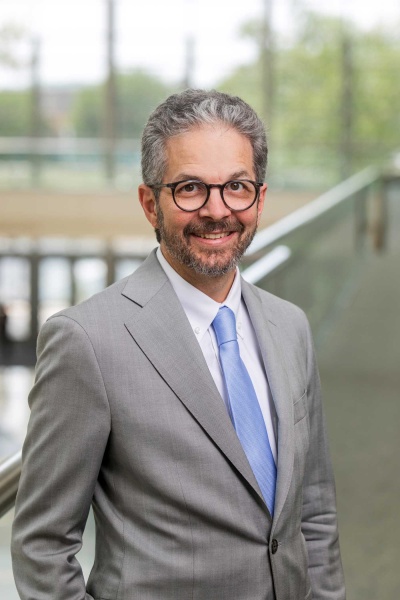“I never wanted to be anything else but a historian,” says Dr. John C. Pinheiro, new Director of Research for Acton Institute.
Pinheiro joined Acton Institute in the fall of 2022, leaving Aquinas College—where he’d been a history professor for 18 years—to lead Acton’s research team. His mission at Acton is clear: to illuminate the foundations of a free and virtuous society and the relationship between economic, religious, and political freedom.
A longtime follower and contributor to Acton Institute, Pinheiro describes his decision to leave his tenured teaching position to head its Research Department as the logical next step of his career. “I wrote an article for Acton, I spoke for them in the local lecture series, as well as at Acton University for over a decade, finally writing a book for Acton Institute in 2019. And so, as a historian at a church-based college, to me, [moving to Acton] was a fairly easy choice.”
Pinheiro is devoted to Acton’s ideals and his dedication to supporting the work of Acton through diligent academic research shines through. “Context really matters,” Pinheiro explains. “And we want to be careful not to become ideologues where we talk all theory and don’t ground things in reality.”
That grounding in reality is one of the main responsibilities for Acton’s Research Department and Pinheiro takes it very seriously. “Academic research … undergirds what we would call public intellectuals who then go on to change institutions and the culture’s and people's minds and opinions. But you need that bedrock, that foundation of the academic research first.”
No stranger to Acton’s programming, Pinheiro has participated in numerous in-person events organized by the Institute, such as Acton University, and is passionate about sharing the historic, anthropologic, and data-based grounding required for public intellectuals to effectively advocate for the kinds of policy changes that encourage a freer and more virtuous society.
“Acton Institute is unique in the world. There's no organization like us that combines the kind of free market emphasis that you might find at Cato [Institute] or Atlas [Network] with an emphasis on humanity as created in the image and likeness of God and what that means for our behavior and for a free society and for a free economy.”
The historical evidence in favor of liberty is clear, but Pinheiro notes Lord Acton’s cautionary reminder that “liberty is the delicate fruit of a mature civilization.” Recording the history of liberty serves as the North Star for Pinheiro’s research team as they set to work in the long, difficult mission to replace falsehoods about American history with restorative, evidence-backed truths. Their efforts provide the foundation upon which scholars, public intellectuals, and policy influencers can build the beacon of the free and virtuous society Acton Institute envisions for the world and to which anyone can look to for guidance.












